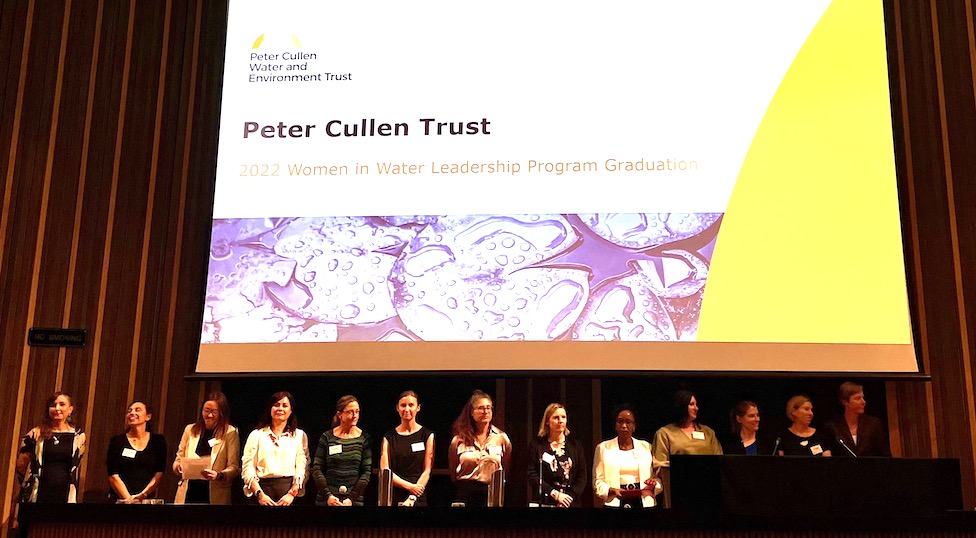Derwent Estuary Program Catchment Scientist and Eco Detection early adopter, Bernadette Proemse PhD joined a group of professionals working in water and environment organisations from all over Australia aiming to create a ripple effect of change to current environmental systems and processes so that the nation’s environmental outcomes are improved for future generations.
On 17 November, the 13 women, who completed the prestigious leadership program withe Peter Cullen Trust (PCT), have formed a cohesive unit to understand the issues and the leadership necessary to tackle complex and urgent policy issues in the face of Australia’s ailing environment.
The Commonwealth Government’s State of the Environment report provides clear evidence of the deterioration of unique, fragile and ancient lands and waterways.
Preserving the environment for generations to come is not an insurmountable task, however it requires courageous leadership and collaboration.
The Peter Cullen Trust Women in Water Class of 2022 will identify some of the leadership actions needed to help repair and rebuild Australia’s natural environment. They invited Peter Cullen Trust fellows and guests present at their graduation ceremony to make a personal commitment to create this desired future.
The Women in Water Leadership 2022 cohort believe passionately in working with First Nations people, environmental groups, economists, scientists, advocates and other vital stakeholders to realise a better future for all.
The group has identified four leadership actions needed to drive a changed system:
- Commitment: to build consensus and secure commitment to act from all levels of government and business; genuinely involve First Nations people, build relationships and invest in two way learning to collaboratively care for country.
- The “Why”: the environmental knowledge is accessible; now there must be a shift in mindset that the environment is external. Everyone is part of the environment. Leaders must win the hearts and minds of the community by speaking to the things people value and articulating why change is needed.
- Continue to make the tough calls: wholesale improvement in legislation is required, to remove the loopholes and duplication that plagues the current system. Leaders need to have the hard conversations about the change that’s needed and then make the tough decisions to enact that change.
- Investment: Government needs to set clear targets for change to drive investment; government and business need to invest at a scale that meets the challenge no just in the short term, but for the long-term.
The 2022 cohort said during their leadership program they were asked to complete numerous tasks, but the main one was to identify the leadership actions needed to develop and implement environmental policy for a changed system.
“Our group recognise the strength we are able to give each other, and acknowledge the support we’ve received in getting here. That’s why we’re asking our PCT fellows and guests to make a commitment to continue to invest in growing leadership capabilities, challenge themselves and have the open, fearless conversations needed to effect lasting change. The ripple effect continues with everyone involved at our graduation ceremony,” they said.
The cohort is well placed to start this ripple effect with water leaders representing policy, regulation, water operations and scientists. Program participants are Department of Water and Environmental Regulation – Western Australia (Fiona Webster), Department of Environment and Water – South Australia (Peta Brettig), Department of Environment, Land, Water and Planning – Victorian Government (Sarah Ryan), Murray-Darling Basin Authority (Jackie Luethi), Greater Western Water (Vikki Kimberlee), Commonwealth Environmental Water Office (Sonia Wood), North Central Catchment Management Authority (Nicole Bullen), Water Corporation – Western Australian (Sharon Arnott and Vanessa Moscovis), Power and Water Corporation, Northern Territory (Kylie Climie, Healthy Land and Water – Queensland (Grace Muriuki), Derwent Estuary Program – Tasmania (Bernadette Proemse) and Alluvium Consulting (Kate Nagato).
The group has emphasised that they feel honoured to have taken part in the Program to date. The real work lies ahead in practising the leadership lessons learned and challenging themselves to continue to grow.
“All of us realise that effecting positive change for our land, water, country and people can often be an overwhelming task. But, by investing in ourselves and each other, and building on the trust we’ve established in this group means we will face these challenges with courage and support future leaders in water.”
“We know it won’t be easy but our Peter Cullen Trust experience has taught us that facing our fears, building strength and examining different perspectives are vital for a healthy environment where our children and their children will thrive,” they said.

